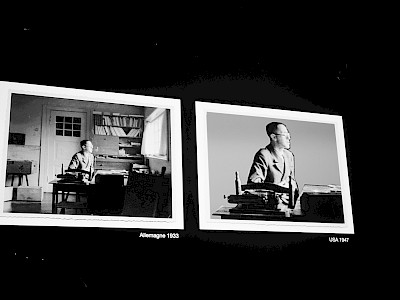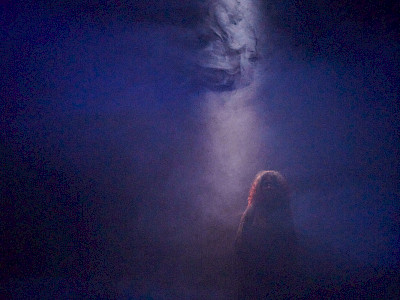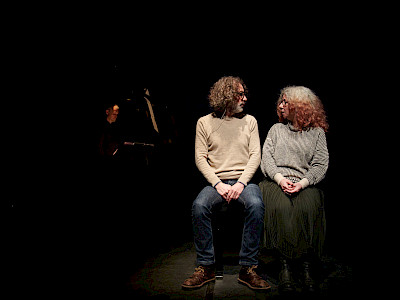18 — 22.05.2025
In 1947, the trial of German playwright Bertolt Brecht took place in the United States, in front of the House Un-American Activities Committee, responsible for combating communist activism. A list of the absurd questions Brecht had to answer during his trial is the starting point of this new poignant performance by Lina Majdalanie and Rabih Mroué.
Exile, trials for subversion, the humanist haven of an untraceable elsewhere, the finding that a supposedly democratic country can also maintain a forceful ban on certain statements; these are the themes running through Four Walls and a Roof. Based on their own voluntary emigration ten years ago from Beirut to Berlin, and faced with the rise of the right wing all over the world, the two artists examine the misfortunes of the idealist Brecht in light of the increasing repression of free speech.
While maintaining the playful approach to theatre that the duo has always practised, they are supported by the presence of a pianist performing songs from Brecht and Eisler. Their historical evocation does not shy away from political reflections on the present: they rightfully make us question how free and open is the liberal democracy in which we are living.
"Their humor, sensible presence that doesn’t want to erase some form of vulnerability, and sense of editing, both visually and textually, create mosaics that always offer the viewer something to play with and think about." - Fabienne Darge, 2024, Le Monde
"Like two tightrope walkers, their fragility and lucidity provide us with a better sense of the histories of our contemporaries. This is how we can summarize the urgency of their theatrical ambition." Marie-José Sirach, 2024, l'Humanité
According to Marx: “History repeats itself, first as tragedy, second as farce.” But if history continues to repeat itself, a third, fourth, nth time, what would it then become? Repe- tition is probably nothing more than a false, superficial im- pression. Does this mean we should dismiss it out of hand? Walter Benjamin puts his finger on the root of the problem: for him, it is only “one single catastrophe which keeps piling up wreckage”. In any case, history enlightens us. As it can also blind us.
Brecht fled Nazi Germany in 1933. After an 8-year long trek, through various European countries, he finally arrived in the United States in July 1941. He had already been in the US for over five years, when in 1947 he was summoned be- fore the House Un-American Activities Committee (HUAC) charged with fighting communist activism, because of his political affiliations.
Years after reading the transcript of Bertolt Brecht’s case in the United States, and the statement he prepared for the Committee, but which he was not permitted to read, these two texts suddenly resurfaced in our memory, and are haunting us. How can we release ourselves from this spectre, except by examining the texts?
A 3rd text by Brecht has also been found, written in 1950 following the condemnation in the United States of those of his colleagues with whom he had shared the dock. Brecht there denounces what he calls a Cold Execution (referring to the Cold War). In this process, the accused was not sent to prison, nor executed, but suffered a much greater pen- alty, imposed by the artistic and cultural “industry” itself: being blacklisted, when the “criminal” is deprived of their livelihood and is unemployed. While retaining a sense of proportion, of course, and given the political, social, historical and contextual differ- ences, is that not what we are seeing today: coordinated and exponential muzzling of freedom of expression? Can- cellation of invitations, awards, conferences, theatrical pieces, exhibitions... Public accusation and condemnation of this writer or that artist, or anyone else... Dismissal of journalists, academics... Public funding subject to political obedience... The list goes on.
Right up to today, many people from various parts of the globe are still fleeing their countries of origin, because of and in circumstances just as frightening as those that 14 Brecht knew, and for which the entire world is more or less responsible. They are trying to find refuge in more demo- cratic countries, that will provide them with a wider and more stable field for free expression. Or at least, so they be- lieve. But they are trapped in the reality. It traps the whole world. Just as it trapped Brecht in the United States.
As for us, Rabih and Lina, we did not flee from Lebanon; we made the free choice to leave to try for a life and work in a more democratic setting, and a wider and more stable field for free expression. Or at least, so we believed. What Brecht denounces in the second part of his statement about the United States, as well as about the content of the case itself, corresponds closely with the waking or half-sleeping nightmares that have harassed and maddened us for some time: passionate and desperate discussions—but useless in the end—with unknown, hostile individuals with closed faces, looking at us from on high, when they condescend to look at us at all, without really seeing us, and certainly without hearing us.
Four Walls and a Roof is based on these two texts by Brecht, on his case, and sometimes on our own lived ex- perience, as well as on other documents.
Lina Majdalanie, March 2025
Presentation: Kunstenfestivaldesarts, Beursschouwburg
Written and directed by: Lina Majdalanie, Rabih Mroué | Performed by: Henrik Kairies, Lina Majdalanie, Rabih Mroué | Dramaturgy: Sandra Noeth | All songs are composed by Hanns Eisler and written by Bertolt Brecht | Additional music composed by Henrik Kairies | Technical director: Thomas Köppel | Photo: Elisabeth Hauptmann - Akademie der Künste, Berlin, Bertolt-Brecht-Archiv, Fotoarchiv 1/86
Production: Festival d’Automne à Paris, CENTQUATRE-PARIS | Coproduction: Kunstenfestivaldesarts, Berliner Festspiele in the framework of ‘Performing Exiles’, HAU Hebbel am Ufer, Künstler*innenhaus Mousonturm, Residenz Schauspiel Leipzig, Kampnagel Internationale Kulturfabrik, Forum Freies Theater
Supported within the framework of the Alliance of International Production Houses by the Federal Government Commissioner for Culture and the Media | Thanks to Brecht Archives (Julia Hartung, Yvonne Büdenhölzer), CENTQUATRE-PARIS, Künstler*innenhaus Mousonturm, Joana Hadjithomas, Khalil Joreige, Urs Koerner, Nikolaus Müller-Scholl, Ludmila Pogodina, Walid Raad, Ivan Txaparro, Anna Wagner, Maximilian Zahn, Andrei Zavalei
Performances in Brussels with the support of the French Embassy in Belgium and the Institut français Paris as part of IF Incontournable




